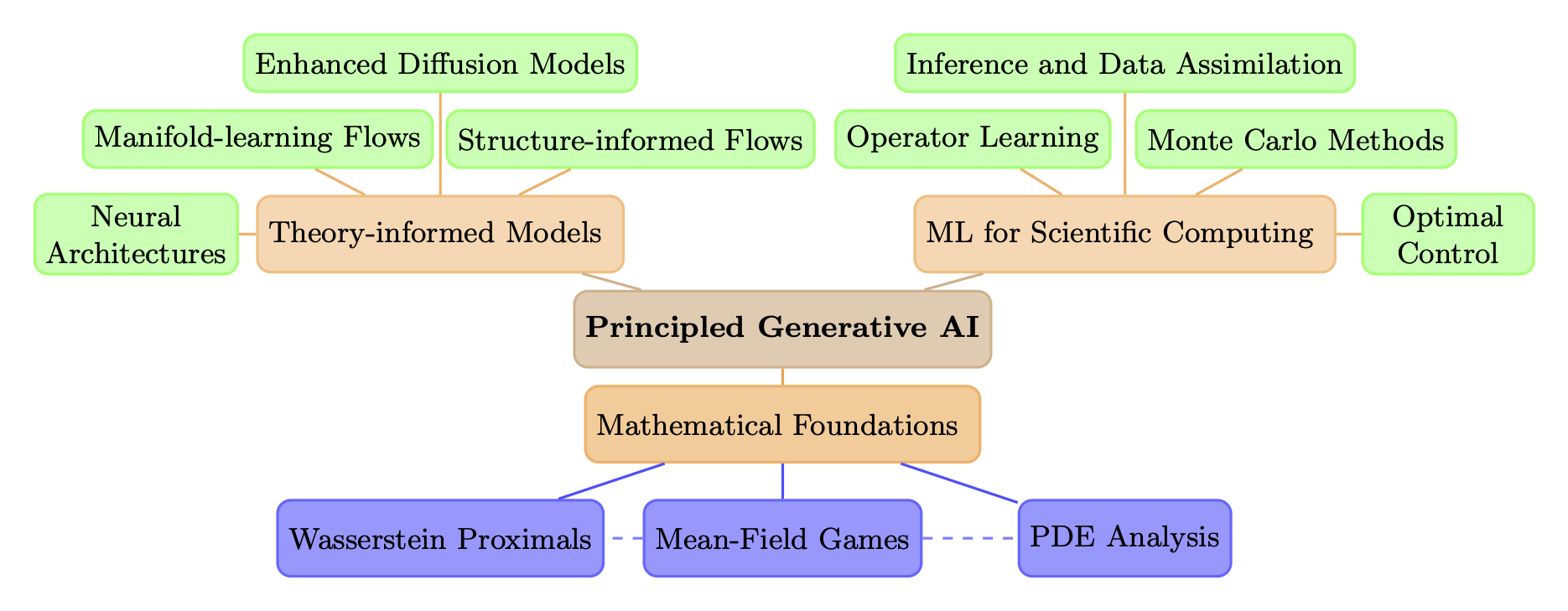Research
Research Overview
I am an applied and computational mathematician with research interests in establishing the mathematical foundations of machine learning (ML) methods and their application in scientific computing. My research program offers new frameworks for understanding ML methods through established mathematical disciplines, enhancing and innovating methods based on those insights, and principled application to scientific computing problems.
My recent work focuses on generative artificial intelligence (AI) through the lens of partial differential equations (PDEs) arising from mathematical control theory and optimal transport. This perspective extends from deep learning architectures to scientific computing applications, leading to methodological improvements and analysis that yield a deeper understanding of state-of-the-art generative flow algorithms. Simultaneously, my study of generative AI produces algorithms for trustworthy scientific machine learning. In particular, my work on robust generative modeling for random differential equations enables probabilistic foundations for operator learning, grounding foundation models for differential equations in this framework and providing uncertainty quantification (UQ). UQ is a recurring theme in my research program, which provides tools for obtaining statistical guarantees, understanding stability of algorithms, and confidence in generative algorithms.
Research Tree
Principled generative AI rooted in mathematical foundations enables improved theory-informed models and trustworthy application in scientific computing.

Research Themes
Mathematical Principles of Generative AI: Foundations and Analysis
Related publications:
- • N. Mimikos-Stamatopoulos, B.J. Zhang, and M.A. Katsoulakis. "Score-based generative models are provably robust: an uncertainty quantification perspective." NeurIPS 2024. [arXiv:2405.15754]
- • K. Kan, X. Li, B.J. Zhang, T. Sahai, S.J. Osher, and M.A. Katsoulakis. "Optimal Control for Transformer Architectures: Enhancing Generalization, Robustness and Efficiency." NeurIPS 2025. [arXiv:2505.13499]
- • B.J. Zhang and M.A. Katsoulakis. "A mean-field games laboratory for generative modeling." 2023. [arXiv:2304.13534]
- • Z. Chen, M.A. Katsoulakis, and B.J. Zhang. "Equivariant score-based generative models provably learn distributions with symmetries efficiently." 2024. [arXiv:2410.01244]
- • R. Baptista, P. Birmpa, M.A. Katsoulakis, L. Rey-Bellet, and B.J. Zhang. "Proximal optimal transport divergences." 2025. [arXiv:2505.12097]
Mathematically-Informed Generative Modeling Methodology
Related publications:
- • J. Birrell, M.A. Katsoulakis, L. Rey-Bellet, B.J. Zhang, and W. Zhu. "Nonlinear denoising score matching for enhanced learning of structured distributions." Computer Methods in Applied Mechanics and Engineering 2025. [arXiv:2405.15625]
- • H. Gu, M.A. Katsoulakis, L. Rey-Bellet, and B.J. Zhang. "Combining Wasserstein-1 and Wasserstein-2 proximals: robust manifold learning via well-posed generative flows." 2024. [arXiv:2407.11901]
- • B.J. Zhang, S. Liu, W. Li, M.A. Katsoulakis, and S.J. Osher. "Wasserstein proximal operators describe score-based generative models and resolve memorization." 2024. [arXiv:2402.06162]
Principled Generative Approaches to Scientific Machine Learning
Related publications:
- • B.J. Zhang, Y.M. Marzouk, and K. Spiliopoulos. "Transport map unadjusted Langevin algorithms: Learning and discretizing perturbed samplers." Foundations of Data Science 2025. [arXiv:2302.07227]
- • B.J. Zhang, T. Sahai, and Y.M. Marzouk. "A Koopman framework for rare event simulation in stochastic differential equations." Journal of Computational Physics 2022. [arXiv:2101.07330]
- • B.J. Zhang, Y.M. Marzouk, and K. Spiliopoulos. "Geometry-informed irreversible perturbations for accelerated convergence of Langevin dynamics." Statistics and Computing 2022. [arXiv:2108.08247]
- • B.J. Zhang, T. Sahai, and Y. Marzouk. "Sampling via controlled stochastic dynamical systems." NeurIPS Workshop 2021.
- • B.J. Zhang, S. Liu, S.J. Osher, and M.A. Katsoulakis. "Probabilistic operator learning: generative modeling and uncertainty quantification for foundation models of differential equations." 2025. [arXiv:2509.05186]
- • P. Dupuis and B.J. Zhang. "Particle exchange Monte Carlo methods for eigenfunction and related nonlinear problems." 2025. [arXiv:2505.23456]
For a complete list of my publications, please visit my Publications page.
